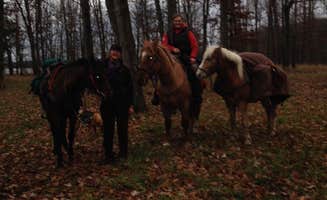Lake Ann, Michigan offers equestrian-friendly camping in the rolling hardwood forests of the northwestern Lower Peninsula. Most equestrian campgrounds in this area sit at elevations between 800-950 feet above sea level. The region's sandy soil provides excellent drainage for horse trails, with trail systems typically connecting directly to camping areas for convenient access without trailering.
What to do
Kayaking on smaller lakes: Lake Dubonnet Trail Camp offers water access for paddlers. "Quiet, not populated, and beautiful views. I've solo camped here a few times and it's great for early morning paddles and peaceful relaxation," notes Kate K. about Lake Dubonnet Trail Camp.
Fishing for unique catches: Anglers can target various species at area lakes. "There is a small lake that is fun for short kayak/canoe rides and fishing. It's called Turtle Lake for obvious reasons- when my kids went fishing, they pulled up large snapping turtles both times," reports Allison H. about Turtle Lake Campground.
Hiking connected trail networks: The state forest provides miles of interconnected paths. "A couple nice hike/bike trails spur off the campground," states Emily V., who stayed at Lake Dubonnet Trail Camp, noting the accessibility of trails directly from camping areas.
What campers like
Privacy between sites: Campers appreciate the spacing at many equestrian campgrounds near Lake Ann. "Campsites are large and fairly separated," reports Thomas H. about Lake Dubonnet Trail Camp, making it ideal for those traveling with horse trailers requiring extra space.
Equestrian-specific amenities: Scheck's Place State Forest Campground provides river access for cooling horses. "We stayed at the trail camp it is quiet with no hookups. You can take as much space as you need and there is access to the river," writes Gemma G., highlighting the flexibility for equestrian campers.
Clean facilities: Even rustic campgrounds maintain good standards. "This campground had easy access to the water, and the restrooms were very clean," notes Judy B. about her horseback riding trip through the area on the Michigan Shore to Shore Trail.
What you should know
First-come camping logistics: Many equestrian campgrounds operate without reservations. "First come first serve sites, but it's a super awesome place to go when everything else is booked," explains James H. about Lake Dubonnet Trail Camp, suggesting it works well as a backup option.
Water access points: Most horse camps provide specific areas for watering animals. At Marzinski Horse Trail Campground, "There's a well kept pit toilet, 21 established campsites w/ firerings, and even a water pump (meant for horses)," according to evi L., who noted the campground's horse-specific design.
Trail closures: State forest horse trails typically close during hunting seasons and spring thaw. Most remain open from May through mid-October with seasonal adjustments for weather conditions.
Tips for camping with families
Grassy sites for cleaner camping: Some campgrounds offer less dirt-heavy sites. "What I liked best about this park was that my children were not caked in dirt. While I understand that comes with the territory of camping, this campground provides a bit more of a grassy setting and offers a nice playground," explains Ann D. about Turtle Lake Campground.
Shallow water access: Northwestern Michigan Fairgrounds provides family-friendly camping near water recreation areas within a 30-minute drive, offering both water and electric hookups for those needing amenities with children.
Self-contained activities: "Rustic campground with access to the Boardman river and many miles of trails in the state forest," writes Anna B. about Scheck's Place, noting it works well for families who bring their own recreation equipment like canoes.
Tips from RVers
Large sites for equestrian rigs: Manton Trails RV Park accommodates larger horse trailers. "We have a 28.6ft 5th wheel and had not problem getting in and parked! Management did an awesome job of spreading out guests until they were full," reports valerie C., highlighting the spaciousness.
Limited hookups at horse camps: Most dedicated equestrian campgrounds offer minimal services. "We stayed here in our van and it was just what we needed. I wish we had a place to dump our grey water, but otherwise it was an easy drive in and had fresh water," notes Tobi W. about Marzinski Horse Trail Campground.
Seasonal considerations: RVers should note most equestrian campgrounds close by mid-October. Northwestern Michigan Fairgrounds operates from May 16 to October 19, providing a slightly extended season for late autumn camping compared to state forest campgrounds.


